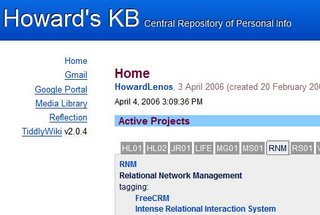A Beautiful digital Mind

I've long been fascinated by the effective use of Wikis to incubate and nurture research and information organically. Exposed to the power of Google search and the breadth of information on the Internet, everyone struggles with how to best interface their brain with the informational waterfall. Common approaches include:
- Bookmark mayhem - bookmark everything and then try to organize your bookmarks
- Tagging - a more flexible, generic style of bookmarking
- Gross capture - using cut and paste methods to copy verbatim information for future reference, hoping you can find it later.
- Wikis - value add contextualization to referential information in a searchable knowledge incubator.
As time wore on, I began to realize that my OneNote knowledge store was decreasing in utility. I started to notice that the structure, although flexible for organizing info, fragmented rather than converged the information I was searching for. More importantly, the value of the knowledge store was degrading due to the lack of "Information Transforming Friction" or "ITF".
A world without friction would be very appealing for producing efficient energy, but makes walking next to impossible. Similarly, "frictionless" knowledge capture is very enticing but soon becomes another useless information heap. I believe there is an optimal level of ITF that results in increasing both the quantity and value of a knowledge store. The magic of a Wiki is that it achieves something very close to this optimal level.
If the ITF is too low, one rapidly builds (and quickly abandons) an information junk pile. If the ITF is too high (document controls and lengthy or complex publishing processes), the result is often a compilation of obsolete information that creates an excellent knowledge facade, but provides very little practical impact.
So, I have now happily returned to my customized version of TiddlyWiki (pictured above), and once again am thankful for the power of optimal ITF to thrive in the information jungle.

Comments
You might want to check out Protégé OWL or this article about it over on NewsForge. I haven't looked into the package deeply yet, but I've been struggling with the same issues of capturing my (limited) knowledge in one place and have considered digging more deeply.
Jean